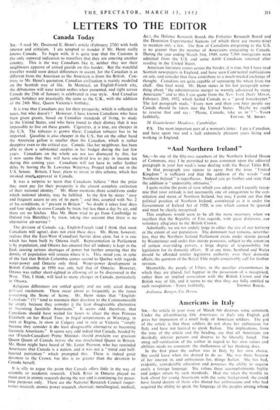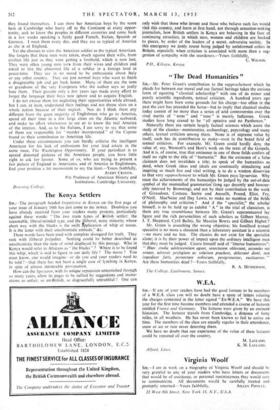Americans in Italy
SIR,—An article in your issue of March 6th deserves some comment. Under the all-embracing title Americans in Italy one English girl gives her impression of a small body of American soldiers. The gist of the article is that these soldiers do not share her enthusiasm for Italy and have not learned to speak Italian. The implications, from the tone of the article and the heading, are that all Americans are decidedly inferior persons and deserve to be liberally hated. The smug self-satisfaction of the author in regard to her own values and abilities needs no comment: the shallowness of her thinking does.
In the first place the author was in Italy by her own choice. She could leave when she desired to do so. She was there because of her interest in, and enthusiasm for, things Italian. She has had, evidently, considerable education and possesses the ability to acquire easily a foreign language. She values these accomplishments highly and judges others by such standards. Had she taken the trouble to look about for young Americans with the sarne background, she could have found dozens of them who shared her enthusiasms and who had acquired the ability to speak the language of the peoples among whom-
they found themselves. I can show her American boys by the score here at Cambridge who hurry off to the Continent at every oppor- tunity, seek to know the peoples in different countries and come back in a few weeks speaking a fairly good French, Italian, Spanish or German. I meet them every day, and they are as typical of America as she is of England.
Yet she chooses to view the American soldier as the typical American. She forgets that these men were taken, much against their wills, from civilian life just as they were getting a foothold, which is now lost. They were often young men torn from their wives and children and asked to live the abnormal life of a soldier in a foreign land in peace-time. They are in no mood to be enthusiastic about Italy or any other country. They are just normal .boys who want to finish a disagreeable job and get back home. Many of them are the sons or grandsons of the very Europeans who the author says so justly hate them. Their parents only a few years ago made every effort to forget the language their boys now ignore and to acquire English.
I do not excuse them for neglecting their opportunities while abroad, but I can, at least, understand their feelings and not throw slurs on a whole nation because of their neglect. Nor do I think them any different from the great majority of Englishmen who go to America, spend all their time in a few large cities on the Atlantic seaboard, and make no effort whatsoever to see 9r to know the real America of the interior. And, as to the Italians, I .am sorry to say that some of them are responsible for murder incorporated" of the Capone brand as their contribution to American life. '
Under these circumstances you can hardly criticise the intelligent American for his lack of enthusiasm for your lead article in the same issue, The Washington Opportunity. If your periodical is to spread distorted pictures of the American people, you have little right to ask for favour. Some of us, who are trying to present a fair picture of England to Americans, and of America to Englishmen, find your position a bit inconsistent to say the least.—Yours faithfully, AVERY CRAVEN. Pitt Professor of American History and Institutions, Cambridge University. Downing College.



































 Previous page
Previous page